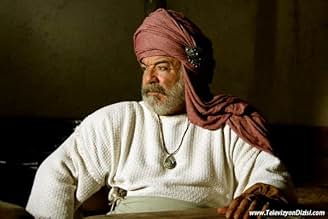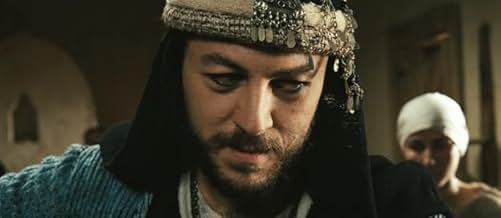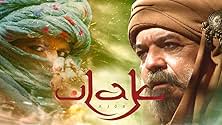Ulak
- 2008
- 1h 49min
VALUTAZIONE IMDb
6,7/10
5038
LA TUA VALUTAZIONE
Aggiungi una trama nella tua linguaIn a place where there is no time, a traveler comes to an unnamed village where we do not know where on the map. The weary traveler is a messenger. They have stories to tell, words to say.In a place where there is no time, a traveler comes to an unnamed village where we do not know where on the map. The weary traveler is a messenger. They have stories to tell, words to say.In a place where there is no time, a traveler comes to an unnamed village where we do not know where on the map. The weary traveler is a messenger. They have stories to tell, words to say.
- Regia
- Sceneggiatura
- Star
- Premi
- 2 vittorie e 9 candidature totali
Zuhal Gencer
- Cemile
- (as Zuhal Gencer Erkaya)
Yagiz Atakan Savas
- Ferhat
- (as Atakan Yagiz)
Recensioni in evidenza
this is a timeless film and a timeless story, full of hope and humanity. the actors are magnificent, especially the children and the storyteller.
altogether a beautiful experience that instills hope in everyone. in a way it is very realistic and based in a seemingly real village. then the film shifts between two stories which are linked and share some actors.
it is encouraging because it exposes evil-doers and gives hope that ethical behavior has still a great value. another plus is that the film shows a life-style of old with beautiful costumes and embellishing of the women's face and is set in a rural place which makes you quite nostalgic.
altogether a beautiful experience that instills hope in everyone. in a way it is very realistic and based in a seemingly real village. then the film shifts between two stories which are linked and share some actors.
it is encouraging because it exposes evil-doers and gives hope that ethical behavior has still a great value. another plus is that the film shows a life-style of old with beautiful costumes and embellishing of the women's face and is set in a rural place which makes you quite nostalgic.
I am pretty sure Chagan Irmak was aware of the fact that the movie is completely different than what people was expecting. He is brave enough to discuss the issues like freedom of speech, military coups in his movies explicitly. But this time, he was indirect and he makes people to think. In most of the Turkish movies, it is a tradition to give the message in a direct way. But this makes Ulak special .. Irmak breaks those traditions. The photography, costumes are were great. Throughout the movie, I tried where/when the story takes place. What is their religion? I liked that disturbance in my mind. which make me to think and I enjoyed my mind trip!
A mysterious stranger with lots of secrets and a lot to say in his tales pays a visit to a village where people are desperate because of the fear and cruelty they have been suffering. Will the stranger give them hopes to overcome their fears? What are people afraid of? Are sins and crimes punished sooner or later?
Cagan Irmak, the successful director of the Turkish film "My father and my son" has created a new masterpiece. His new film Ulak "The Messenger" is quite different to his first film. The theme and plot are both striking. Costumes and music make the story seem to be real. Acting is spellbinding. The Turkish Cinema is certain to have a new master now.
Cagan Irmak, the successful director of the Turkish film "My father and my son" has created a new masterpiece. His new film Ulak "The Messenger" is quite different to his first film. The theme and plot are both striking. Costumes and music make the story seem to be real. Acting is spellbinding. The Turkish Cinema is certain to have a new master now.
Set in an unspecified medieval period, ULAK centers on Zekeriya, a doctor (Çetin Tekindor) who visits a village and begins to tell mysterious stories of the past, present and future to a group of children and adults. The stories focus on the power of God, the importance of remaining true to oneself and the need to overcome tyranny. The center of his tales is a crippled character Murad (Ömer Hüsnü Turat) who possesses some kind of spiritual power despite his disability.
Zekeriya's presence within the community immediately causes suspicion: what kind of power does he have over the children? For the village elders, accustomed to wielding their patriarchal power over their women and their offspring, he represents a subversive force, and therefore needs to be removed. The only snag is that he possesses the kind of resilience that is infectious - so infectious, in fact, that he encourages the children to resist their parents. Young Ferhat (Atakan Yağız) offers a case in point - despite his father's attempts to beat him into submission, he remains unbowed, and eventually departs with Zekeriya to a better world.
Part-fantasy, past religious epic, Çağan Irmak's film underlines the importance of being true to oneself, even if life's circumstances turn against you. This is way Zekeriya preaches, using his autobiographical experiences with Murad as an example. Tyrannies will never survive in a world whose inhabitants understand the existence of a higher power in whom they can trust. Such views are not only religiously important, they have an intimate bearing on contemporary politics. The film's ending is particularly satisfying, as the children and the believers go forth into a promised land, leaving the former tyrants and their families to die. ULAK is particularly harsh on those who simply follow popular sentiment without understanding anything about themselves or the societies they inhabit. They are at once the least intelligent yet most dangerous of people.
To be honest, some of the action is a little sentimental, adumbrating some of Irmak's later work such as THE SLEEPING PRINCESS (PRENSES'IN UYKUSU), especially towards the end of the the film when Zekeriye reveals the ending to his tale to the accompaniment of swirling violins on the soundtrack. There is also the question of the film's epigraph, dedicated to all children with the capacity to dream; on this view, Irmak suggests that all adults have somehow been corrupted and it is incumbent on the younger generation to create a better world. This might be true, but it suggests a view of childhood with its roots in European Romanticism rather than spirituality.
Zekeriya's presence within the community immediately causes suspicion: what kind of power does he have over the children? For the village elders, accustomed to wielding their patriarchal power over their women and their offspring, he represents a subversive force, and therefore needs to be removed. The only snag is that he possesses the kind of resilience that is infectious - so infectious, in fact, that he encourages the children to resist their parents. Young Ferhat (Atakan Yağız) offers a case in point - despite his father's attempts to beat him into submission, he remains unbowed, and eventually departs with Zekeriya to a better world.
Part-fantasy, past religious epic, Çağan Irmak's film underlines the importance of being true to oneself, even if life's circumstances turn against you. This is way Zekeriya preaches, using his autobiographical experiences with Murad as an example. Tyrannies will never survive in a world whose inhabitants understand the existence of a higher power in whom they can trust. Such views are not only religiously important, they have an intimate bearing on contemporary politics. The film's ending is particularly satisfying, as the children and the believers go forth into a promised land, leaving the former tyrants and their families to die. ULAK is particularly harsh on those who simply follow popular sentiment without understanding anything about themselves or the societies they inhabit. They are at once the least intelligent yet most dangerous of people.
To be honest, some of the action is a little sentimental, adumbrating some of Irmak's later work such as THE SLEEPING PRINCESS (PRENSES'IN UYKUSU), especially towards the end of the the film when Zekeriye reveals the ending to his tale to the accompaniment of swirling violins on the soundtrack. There is also the question of the film's epigraph, dedicated to all children with the capacity to dream; on this view, Irmak suggests that all adults have somehow been corrupted and it is incumbent on the younger generation to create a better world. This might be true, but it suggests a view of childhood with its roots in European Romanticism rather than spirituality.
This film definitely has its own way of telling a story. While watching, it gives you the feeling of listening to a fairy tale, which I haven't felt for many years. I must admit that the film has religious implications, because of the story in the background, but they are not necessarily negative criticisms. By choosing children as the main audience in the "messiah story", this film separates itself from any other religious-story-telling films or books. The costumes, acting and conversations all have that fairy tale style as a whole. I see "hope" as the main theme of this film as "even an unrealistic hope can change people's lives". Please don't watch and judge this movie with your or others belief-defending opinions. It just shows the power of imagination. Also it is a good and a different step for Turkish cinema.
I più visti
Accedi per valutare e creare un elenco di titoli salvati per ottenere consigli personalizzati
Dettagli
Botteghino
- Lordo in tutto il mondo
- 3.248.267 USD
- Tempo di esecuzione1 ora 49 minuti
- Colore
- Proporzioni
- 2.35 : 1
Contribuisci a questa pagina
Suggerisci una modifica o aggiungi i contenuti mancanti











